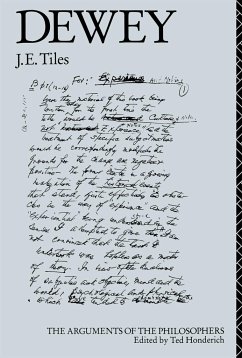John Dewey was a pioneer of progressive educational approaches, as well as a politically active liberal and an unconventional philosopher. His highly original version of pragmatism--his "instrumentalism"--has held a pre-eminent place in American philosophy during the first half of this century. The dominant characteristic of Dewey's thought was his desire to resist thinking of the main aspects of human life in isolation from one another, and to resist the institutionalization of their separation. J. E. Tiles traces the consequences of Dewey's philosophy by relating them to the views of his fellow pragmatists, James and Peirce, and confronting them with the criticisms of his contemporaries, such as Russell and Lovejoy. This book also contrasts Dewey's ideas with doctrines advanced by philosophers of the past such as Aristotle and Hume, as well as by philosophers who have risen in prominence since Dewey's death, such as Bernard Williams and Thomas Nagel.








